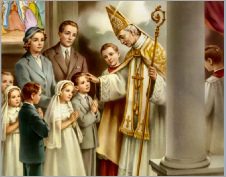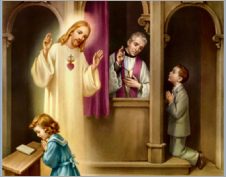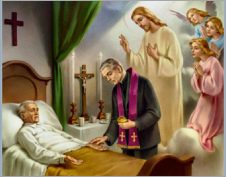Christ instituted the sacraments of the new law. There are seven: Baptism, Confirmation (or Chrismation), the Eucharist, Penance, the Anointing of the Sick, Holy Orders and Matrimony. The seven sacraments touch all the stages and all the important moments of Christian life: they give birth and increase, healing and mission to the Christian’s life of faith. There is thus a certain resemblance between the stages of natural life and the stages of the spiritual life.
– Catechism of the Catholic Church, n.1210
Baptism
 Baptisms usually take place every second Sunday of the month after the 12:00 pm Mass.
Baptisms usually take place every second Sunday of the month after the 12:00 pm Mass.
Call the parish office if you would like to have your baby baptized. You may have to attend a class first, especially if you are first-time parents.
If you are an adult who wishes to be baptized, please contact the parish office in order to make arrangements for RCIA.
Forms
Godparent/Sponsor Forms (COMING SOON)
Baptism FAQ
Why is it necessary to be Baptized?
Holy Baptism is the basis of the whole Christian life, the gateway to life in the Spirit (vitae spiritualis ianua), and the door which gives access to the other sacraments (CCC 1213). Through the sacrament of baptism, we are freed from Original Sin and are reborn as sons and daughters of God. We become members of Christ, are incorporated into the Church, and are made sharers in His mission. Finally, we are made heirs of Heaven.
What are the requirements of being a godparent?
Godparents are called to assist Christian parents in raising their children in the Catholic faith. In order to serve as a godparent for baptism, one must be at least 16 years old and must be a practicing Catholic who has been fully initiated (i.e., have received the sacraments of Baptism, Confirmation, and the Eucharist).
A baptized, non-Catholic may not serve as a godparent, but may serve as a “witness.” There must be at least one godparent.
Can I have only one godparent? Can I have two godmothers or two godfathers?
It is permissible to have only one godparent. If there are two, there must be one godfather and one godmother, imitation the Holy Family of Mary and Joseph.
Confirmation
 If you are interested in receiving the Sacrament of Confirmation, please contact our Director of Religious Education to sign up for Religious Education classes.
If you are interested in receiving the Sacrament of Confirmation, please contact our Director of Religious Education to sign up for Religious Education classes.
If you are an adult who wishes to be baptized, please contact the parish office in order to make arrangements for RCIA.
Confirmation FAQ
What is Confirmation?
Baptism, the Eucharist, and the Sacrament of Confirmation together constitute the “sacraments of Christian initiation,” whose unity must be safeguarded. It must be explained to the faithful, that the reception of the Sacrament of Confirmation is necessary for the completion of baptismal grace (CCC 1285).
Why should I be Confirmed?
Through Confirmation, the grace of Baptism is strengthened within us. In Baptism, we are made sharers of Christ’s mission. In Confirmation, we receive the strength that we need to carry out that mission.
What are the gifts of the Holy Spirit?
In Confirmation, we receive the gifts of the Holy Spirit: Wisdom, Understanding, Fortitude, Knowledge, Piety, and Fear of the Lord.
What are the requirements for being a sponsor?
A sponsor must be a practicing Catholic over 16 years of age who has received Baptism, Confirmation, and First Eucharist. The sponsor can be a different person than the one chosen as the godparent, but ideally should be the same person.
Eucharist
 The Catechism of the Catholic Church says that the Eucharist is the source and summit of the Christian Life. As Catholics, the Eucharist forms the center of our lives. Here at St. Edward on the lake, the Eucharist forms the center of our parish and our school.
The Catechism of the Catholic Church says that the Eucharist is the source and summit of the Christian Life. As Catholics, the Eucharist forms the center of our lives. Here at St. Edward on the lake, the Eucharist forms the center of our parish and our school.
As Catholic, we believe with all our hearts that the Eucharist is the Body, Blood, Soul, and Divinity of Jesus Christ. We encourage you to join us in our celebration of the Eucharist every Sunday as we give God the worship that He deserves, thank Him for the blessings that He has given to us, and receive the spiritual nourishment that we need to live holy lives and become saints.
If your child needs to receive his/her First Communion, please contact the Director of Religious Education.
Resources
Eucharist FAQ
Why should I go to Mass?
The word “Eucharist” means “to give thanks”. We come to Mass to give thanks to God for the many blessings that He’s given us. We come to Mass to give God the worship that He deserves. Through the Eucharist, God gives us the spiritual nourishment that we need to live holy lives. It is the Third Commandment that calls for us to keep the sabbath day holy.
Your Mass schedule says that some Masses are “Tridentine.” What does that mean?
In the Roman Rite, there are two forms of the Mass. There is the Ordinary Form (the Mass of Paul VI given to the Church at the Second Vatican Council). This is the form of the Mass that is most common in Catholic Churches everywhere and is usually offered in English There is also the Extraordinary Form (the Mass of Pius V given to the Church at the Council of Trent, hence the name “Tridentine”). This Mass is offered in Latin. Both forms of Mass are legitimate, which is why they are both offered here at St. Edward.
If you’ve never attended Mass in the Extraordinary Form, you are encouraged to check it out. There are resources available to assist you.
Penance
 The Sacrament of Penance is offered in the church nearly everyday. See the schedule on the home page for updated confession times.
The Sacrament of Penance is offered in the church nearly everyday. See the schedule on the home page for updated confession times.
You may also call the office to make an appointment for confession.
Resources
Penance FAQ
Why go to confession?
Jesus gave us the Sacrament of Confession to free us from our sins so that we can be reconciled back to Father and to the Church, both of whom we are separated from by sin.
Why should I confess my sins to a priest?
We can (and should) go directly to God and ask for forgiveness. At the same time, Jesus gave His Apostles the authority to forgive sins in His Name (John 20:23). This authority has been handed on to priests through the sacrament of Holy Orders. By going to a priest, we hear the words of absolution and receive advice on how to avoid sin in the future.
Is general absolution allowed?
No. Canon Law clearly says that we must go to confession and receive absolution individually.
Anointing of the Sick
 If you or someone that you know needs to be anointed, please call the parish office at (810) 385-4340. In the case of an emergency, you may call the emergency line at (810) 294-0050. Please use this number only outside of office hours.
If you or someone that you know needs to be anointed, please call the parish office at (810) 385-4340. In the case of an emergency, you may call the emergency line at (810) 294-0050. Please use this number only outside of office hours.
Resources
Anointing of the Sick (EWTN)
Anointing of the Sick FAQ
What is the Anointing of the Sick?
Through the prayer of the Church and the anointing with holy oil, the sick person is commended to God’s care so that he/she may persevere in their suffering with faith and have the strength to offer their sufferings for the good of the Church.
It used to be called “Last Rites”. Is that still the case?
No. The Anointing of the Sick is not just for those who are close to death. One who is seriously sick or preparing for major surgery can also be anointed.
Holy Orders
As baptized Catholics, each one of us has what is called a vocation. The word “vocation” comes from a Latin word that means “to call”. In the case of a religious vocation, it is God who does the calling. He calls us to a particular form of service in the Church. It’s up to us to listen for that call and respond to it generously.
Among the baptized, some are called to the married life. However, some are called to serve God as priests.
If you feel that God is calling you to be a priest or deacon, feel free to speak with Fr. Acervo at any time.
Resources
- detroitpriestlyvocations.com, the website for the Office of Vocations for the Archdiocese of Detroit.
- Prayers
Holy Orders FAQ
What is Holy Orders?
Holy Orders is the sacrament through which the mission entrusted by Christ to his apostles continues to be exercised in the Church until the end of time: thus it is the sacrament of apostolic ministry. It includes three degrees: episcopate, presbyterate, and diaconate (CCC 1536).
Why are only men allowed to receive Holy Orders?
The Church does not have the authority to ordain women because Christ did not give her that authority. The priest acts “in persona Christi” or “in the person of Christ” who came as a man. He also gave His Apostles, who were all men, the authority to act in His Name.
Matrimony
If you are interested in getting married in the Catholic Church, please contact the parish office to make an appointment to see Fr. Acervo.
Forms
- Wedding Planning Booklet (COMING SOON)
Matrimony FAQ
Why should I get married in the Church?
In the words of Archbishop Fulton Sheen, “It takes three to get married”. Jesus Christ elevated marriage to a sacrament so that husband and wife would have the graces necessary to become holy by living the vocation of marriage. Through their cooperation in God’s plan, husband and wife show the world what love looks like, and by that love, they bring new life into the world.
Why is marriage only between one man and one woman?
God made them male and female. And so God ordained marriage to be strictly between one man and one woman. Because they compliment each other, man and woman bring their unique gifts to marriage and provide a stable environment into which children can be born. Marriage is not a human invention. God gave it to us for a reason, and so no one can “redefine” marriage”.
Why does the Catholic Church ask us not to live together before marriage?
Marriage requires a total commitment and giving of self between spouses. When a couple chooses to simply live together, they simulate marriage without truly giving themselves to each other completely.
Catholics also believe that sex is holy, reserved as an expression of the love between husband and wife.

